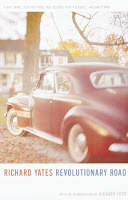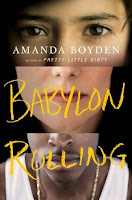 Richard Yates’s novel, Revolutionary Road, has been sitting beside my bed for over a week. I’m finished reading it but I didn’t want to put the book away. In a way, I sort of felt as though I wasn’t quite done with the novel. It’s honestly one of the best books I’ve read in a long time, a definite modern classic, a story with the cold, almost clipped air of Capote with a desperate current of sadness running throughout. I have yet to see the movie and, in a way, even though it’s the only reason I’ve read the book, I don’t want to now. I’m too afraid it’ll ruin it. Even still, Leonardo DiCaprio and Kate Winslet were running through my head as the two main characters: Frank and April Wheeler. I guess that’s not to be helped.
Richard Yates’s novel, Revolutionary Road, has been sitting beside my bed for over a week. I’m finished reading it but I didn’t want to put the book away. In a way, I sort of felt as though I wasn’t quite done with the novel. It’s honestly one of the best books I’ve read in a long time, a definite modern classic, a story with the cold, almost clipped air of Capote with a desperate current of sadness running throughout. I have yet to see the movie and, in a way, even though it’s the only reason I’ve read the book, I don’t want to now. I’m too afraid it’ll ruin it. Even still, Leonardo DiCaprio and Kate Winslet were running through my head as the two main characters: Frank and April Wheeler. I guess that’s not to be helped.
As two young people, Frank’s just about to turn 30, and April’s a few years younger, playing hard at adulthood during the early 1960s, the Wheelers have everything. Two kids, a lovely home on Revolutionary Road, and should, for all intents and purposes, be happy. Yet, they’re not, they fight, sometimes for days at a time, and both cling to a sense of unease that bubbles up and surfaces in their actions not only toward one another but to other people in the world. The clinical nature of Yates’s prose, his exacting way with words, cuts them down piece by piece, pulling out the human bits within the detrious of their suburban lives. The novel is Mad Men only Frank’s not as interesting as Don Draper, which makes it even more tragic, I think. People smell bad in Revolutionary Road; they appear in ways that betray their perfect stone paths and upkept lawns. Life is never what it seems on the surface, not for a single character, and no one survives unscathed.
So, one day, when April hatches a plan, to escape to Paris and start over so that Frank can really find himself, there’s a spark of interest and ingenuity to both of their lives. Suddenly, they’re better than their neighbours, different, not the same sheep on the commuter train. Only change is hard to make, it doesn’t come easily and it never turns out the way you’d expect, especially in this novel. I haven’t even seen the picture and I’m going to recommend reading the book first. I simply don’t see how it could possibly be any better.








